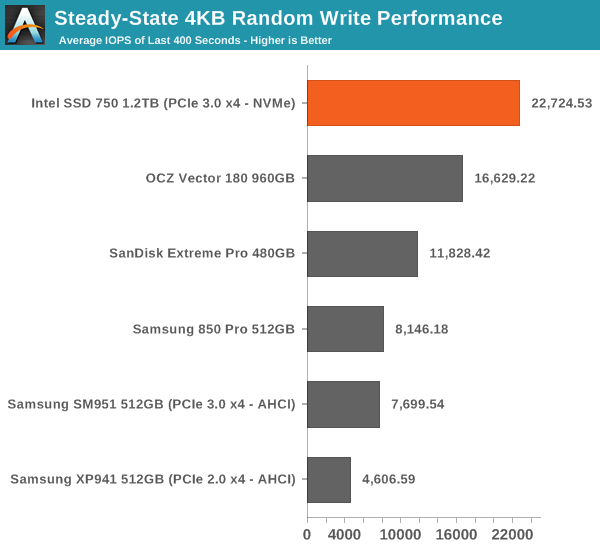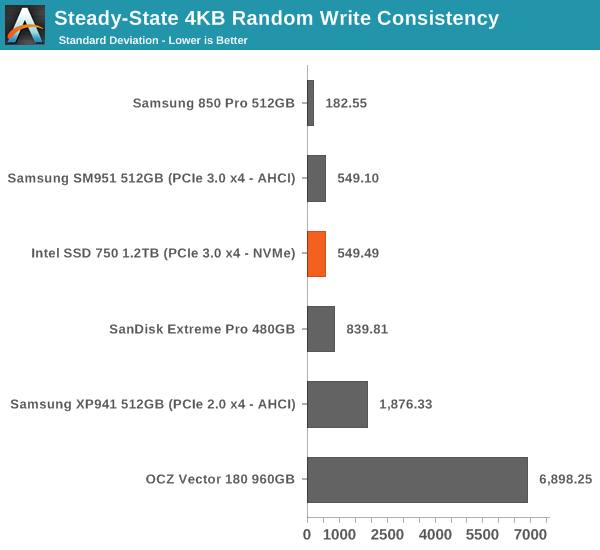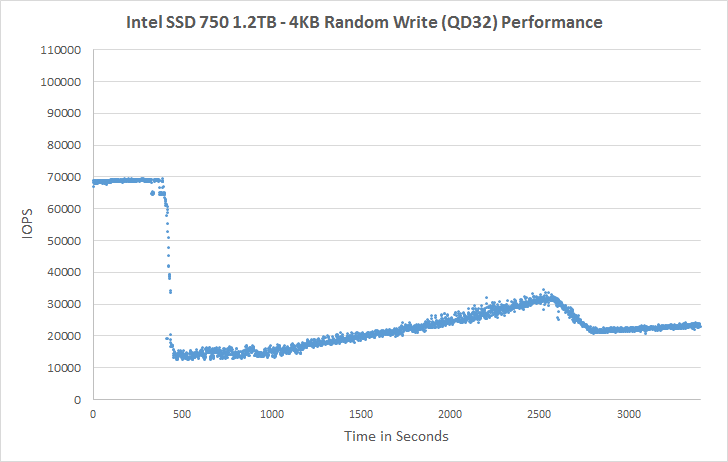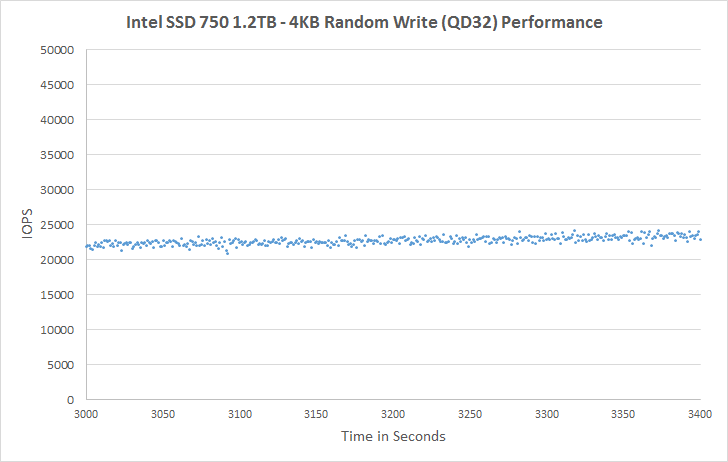Intel SSD 750 PCIe SSD Review: NVMe for the Client
by Kristian Vättö on April 2, 2015 12:00 PM ESTPerformance Consistency
We've been looking at performance consistency since the Intel SSD DC S3700 review in late 2012 and it has become one of the cornerstones of our SSD reviews. Back in the days many SSD vendors were only focusing on high peak performance, which unfortunately came at the cost of sustained performance. In other words, the drives would push high IOPS in certain synthetic scenarios to provide nice marketing numbers, but as soon as you pushed the drive for more than a few minutes you could easily run into hiccups caused by poor performance consistency.
Once we started exploring IO consistency, nearly all SSD manufacturers made a move to improve consistency and for the 2015 suite, I haven't made any significant changes to the methodology we use to test IO consistency. The biggest change is the move from VDBench to Iometer 1.1.0 as the benchmarking software and I've also extended the test from 2000 seconds to a full hour to ensure that all drives hit steady-state during the test.
For better readability, I now provide bar graphs with the first one being an average IOPS of the last 400 seconds and the second graph displaying the standard deviation during the same period. Average IOPS provides a quick look into overall performance, but it can easily hide bad consistency, so looking at standard deviation is necessary for a complete look into consistency.
I'm still providing the same scatter graphs too, of course. However, I decided to dump the logarithmic graphs and go linear-only since logarithmic graphs aren't as accurate and can be hard to interpret for those who aren't familiar with them. I provide two graphs: one that includes the whole duration of the test and another that focuses on the last 400 seconds of the test to get a better scope into steady-state performance.

Given the higher over-provisioning and an enterprise-oriented controller, it's no surprise that the SSD 750 has excellent steady-state random write performance.

The consistency is also very good, although the SSD 750 can't beat the 850 Pro if just focusing on consistency. When considering that the SSD 750 provides nearly three times the performance, it's clear that the SSD 750 is better out of the two.
 |
|||||||||
| Default | |||||||||
At the initial cliff the performance drops to around 15K IOPS, but it quickly rises and seems to even out at about 22-23K IOPS. It actually takes nearly an hour for the SSD 750 to reach steady-state, which isn't uncommon for such a large drive but it's still notable.
I couldn't run tests with added over-provisioning because NVMe drives don't support the usual ATA commands that I use to limit the LBA of the drive. There is similar command set for NVMe as well, but I'm still trying to figure out how to use them as there's isn't too much public info about NVMe tools.
 |
|||||||||
| Default | |||||||||










132 Comments
View All Comments
oranos - Friday, April 3, 2015 - link
Insane performance, insane value. What else to say? Intel never loses a step and surprises at every turn.Peichen - Friday, April 3, 2015 - link
Sounds like there is going to be big form factor change coming to desktop computer in the next few years. Complete removal of 5.25 and 3.5" drives, M.2 and 2.5" drives taking over, CPU limted to <77W and video card to <250W.I should hold off replacing my still very good case until I am building a new computer in 3~4 years.
cjones13 - Friday, April 3, 2015 - link
how would this drive compare with a 4 drive (samsung 850 pro 512), two card Sonnet tempo ssd pro plus arrangement? this set up is about $600 more, but 800GB larger and overall ~same $/GB @.82Freakie - Friday, April 3, 2015 - link
Maybe I'm just blind, but I don't see this 750 in Bench? Did someone forget to add it to Bench or is there a reason why it's not in there?boe - Saturday, April 4, 2015 - link
Those 10TB and 32TB SSDs can't come soon enough. I just hope they come down to an affordable price very soon as standard SSDs are still way to expensive per TB for any real storage needs.gattberserk - Saturday, April 4, 2015 - link
Can I ask why is the boot time so slow? For a drive this expensive this is not something that is tolerable.Is it possible to do a boot up timing with the fast boost function enabled? I wanna see how fast will it be as compared with other SATA drives using the same fast boot function.
The boot up time will be the last factor to decide if I wanna pull trigger on this one.
Laststop311 - Saturday, April 4, 2015 - link
This drive is a beast and just raised the cost of my skylake-e build another 1000 dollars. Maybe an even better 2nd generation version will be out by then. Upgrading my gulftown to 8 core skylake-e flagship. 4.3ghz i7-980x will have lasted me 7 years by the time skylake-e comes out which is a pretty darn good service life. Convert the ole gulftown into a seedbox/personal cloud nas/htpc/living room gaming console. Kill all the oc's and undervolt cpu for the lowest voltage stable at stock and turn all the noctua fans down with ULN adapters into silence mode. It will be rough re buying a buncha parts I wouldn't of had to if I didn't keep the PC together but it's too good of a PC still to dismantle for parts. Will be nice having a beastly backup pc.My skylake-e build has really ballooned in price but this next upgrade should last a full decade with a couple gpu upgrades using the flagship skylake-e 8 core i7 + 1.2TB intel 750 boot drive + nvidia/amd flagship 16nm FF+ GPU. Basically like 3000 dollars just in 3 parts :(. Thats ok tho it brings too many features to the table pci-e 4.0 DMI 3.0 USB 3.1 built into chipset natively 10gbit ethernet natively up to 3x ultra m2 slots and the SFF connector used in this drive possibly thunderbolt 2 built in natively of course quad channel ddr4. Hopefully better overclocking with the heat producing FIVR removed guessing 4.7-5ghz will be possible on good water cooling to the 8 core.
Sorry got on a tangent. I'm just excited there are finally enough upgrades to make a new PC worth it. No applause for intel tho it took them 7 years to make a gulftown PC worth upgrading. I should see a nice IPC gain from i7-980x gulftown to skylake-e. I'll be happy with 50-60% IPC gain and 500 extra mhz on my 980x so 4.8ghz. I think 6x 140mm high static pressure noctuas in push/pull and a 420mm rad should provide enough cooling for 4.8ghz on 8 core skylake-e if the chip is capable. Goal is to push it to 5.0ghz tho and get 700mhz speed increase + additional 55% IPC gain.
gattberserk - Sunday, April 5, 2015 - link
Unfortunately Skylake e is not coming in another 2 years. There is no news of BW-E even, and that will be another year before Skylake will come in.By den, 750 would have been obsolette, esp with Samsung 3D NAND in NVMe PCIe SSD.
JatkarP - Saturday, April 4, 2015 - link
<$1/GB at 2400/1200 MBps R/W performance. What else you need !!Ethos Evoss - Saturday, April 4, 2015 - link
|I wud rather go for new Plextor which is 5 time cheaper and with same specs..